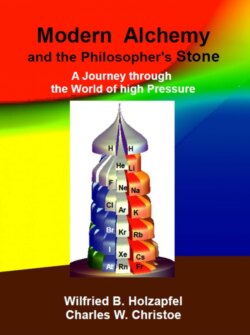Читать книгу Modern Alchemy and the Philosopher's Stone - Wilfried B. Holzapfel - Страница 8
На сайте Литреса книга снята с продажи.
ОглавлениеHelen and Marie were still at a loss for words. “Did you also carve this model?” Helen wanted to know.
“No,” the professor explained. “I only produced this illustration on my desktop. But later I was able to use the same software with a machine called a three-dimensional printer that built up the solid structure from special plastic, one very thin layer upon the others. After that, I used the machine to produce a three-dimensional model made of titanium powder, again one layer upon the other. I can show you that model some other time.”
Marie wondered to herself what kind of a program might have been used to describe such a complex structure and what kind of programming language the professor might have used.
The professor continued, “The statue that I am trying to reproduce here will actually be a three-dimensional chart of the elements, but it will display more information than the usual two-dimensional variety.”
“Do you mean the usual two-dimensional chart of the elements that hangs in every chemistry lab?” Marie blurted out without thinking and then blushed with embarrassment.
“That very one,” the professor assured her with a comforting nod.
Helen broke the awkward moment of silence, “We certainly had not guessed anything like that!”
“I’m sure you hadn’t.” The professor continued to be supportive of the students’ curiosity. “Stop by my office in the Physics Building some day and I’ll explain more about it. My office hours are posted on the Faculty page of the university website.”
Professor Wood changed the subject. “Is there a specific ‘liberal art’ that has captured your interest, Helen?”
“I’m thinking about majoring in Philosophy,” she replied, relieved not to have been called upon to remember anything more about the chart of the elements than its dominating presence in her high-school chemistry class room.
Helen had taken an advanced chemistry course as a senior in high school, primarily with the goal of earning the college credit that would preclude her having to take a lab science once she actually got into an undergraduate college program. She had done well in the course and the university had indeed accepted her credits toward a degree in liberal arts. But Helen would be hard pressed to say that she had really enjoyed the experience. She had frequently found the concepts difficult to grasp and she had to rely more often than she would like to admit upon sheer memorization to get the score she wanted on a quiz or a test. The laboratory had been even more of a struggle for her. She was not particularly precise in her handling of physical objects and was prone to inadvertently contaminating her lab specimens.
“Philosophy! Perfect!” the professor exclaimed. “We have a lot to talk about.”
“Well, I certainly look forward that,” Helen said with a smile of false confidence, having no idea about where such a conversation might go. “I guess we should let you get back to your work.”
“Yes,” agreed Marie quickly. “We also have to be on our way. It’s nice to have met you and thanks for clearing up our misconceptions about your sculpture.”
“I sense that ‘clearing up’ is somewhat of an overstatement of what has transpired here today, but I want to re-enforce my invitation to the two of you to visit me on campus. Would it help to raise your curiosity if I said that I think of the philosophy underlying this model as modern alchemy?”
The students look at each other and then back to the professor. They all exchanged nods of agreement and said their adieus. Helen and Marie continued on their way back to the dorm.
“What do you think about that?” Helen asked her friend.
“I guess I’m glad that you were so bold as to introduce yourself, but I am pretty confused about where all this is going. Are you really thinking that we should follow up with an office visit?”
“Sure. I think it would be very rude not to – after all the effort he put forth to make us feel welcome.”
